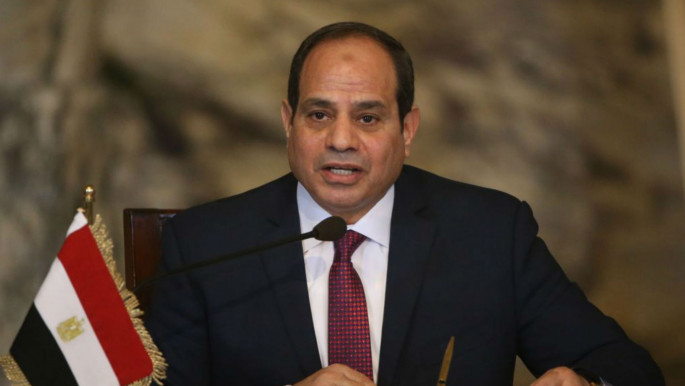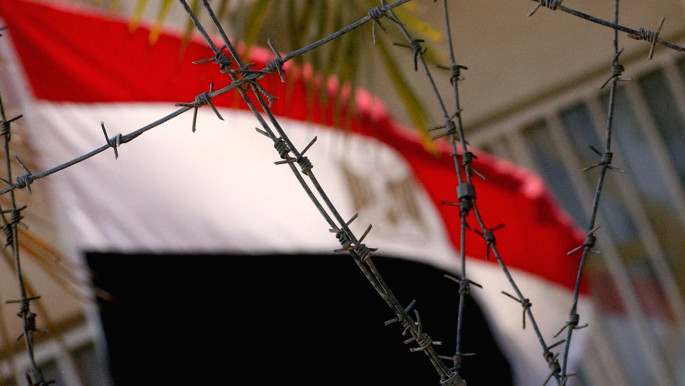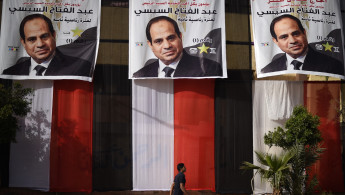Disaster looms for Egypt's political prisoners as coronavirus fears mount
They are trying to give hand sanitiser and medicine to family members, many of whom are among the estimated 60,000 political prisoners detained in Egypt.
According to the International Committee of the Red Cross, conditions in prisons mean detainees are at high risk of outbreaks of Covid-19.
Poor conditions are well-documented. Overcrowding is rife, with some cells reportedly too full for prisoners to sleep lying down. Running water, food and especially medical treatment are often scarce.
Many political detainees are held on fabricated charges or without any charges at all in pre-trial detention.
"Coronavirus is an extreme concern given what we know about the conditions and that cases have exploded in Egypt over the past few weeks," Amr Magdi, Middle East and North Africa researcher for Human Rights Watch, told The New Arab.
With visits from family and lawyers, as well as phone calls, banned since March, what little contact or supplies that could be sent to prisoners has dried up completely.
 |
There are growing concerns that a crisis in Egypt's prisons may be on the horizon |  |
At the same time, reports of the death of a prison employee at the Tora complex emerged last month. The Ministry of Interior later confirmed he had tested positive for coronavirus.
There are growing concerns that a crisis in Egypt's prisons may be on the horizon.
"Bringing medicine to the Tora prison gate is the only way you can try to help," Abdullah El Haddad told The New Arab. "My family tried many times, but the guards would not let them."
 |
|
| Read more: Sisi uses coronavirus to enshrine new powers at the expense of his people |
Abdullah's father, Dr. Essam El-Haddad, a former advisor to President Mohamed Morsi, was arrested on the night of the military coup in 2013 which saw President Abdel Fattah al-Sisi assume control.
Abdullah's brother Gehad, a political activist and chief spokesman for the Muslim Brotherhood, was detained three months later.
Essam is 66 years old. He has suffered four heart attacks since being in prison and usually takes six forms of medicine a day. "He could not be more vulnerable. His age, his heart, and many other conditions make him high risk for coronavirus. He is not receiving any treatment," says Abdullah.
Gehad is also suffering from malnutrition. "They are effectively being killed," says Abdullah. Abdullah, who was studying Engineering in the UK at the time, has not spoken with his father or brother since their arrests.
Almost seven years later both remain in detention, despite their original charges, which included terrorism offences, being overturned in 2014.
Essam was later sentenced to 10 years for being a member of the Muslim Brotherhood. Gehad is being held in pretrial detention. "My father's charge is political. We have no idea what Gehad's charges are. His detention is unlawful and arbitrary", says Abdullah.
 |
Coronavirus is an extreme concern given what we know about the conditions and that cases have exploded in Egypt over the past few weeks |  |
A panel of UN experts came to the same conclusion. In a report published in October 2019, they made clear that the detention is arbitrary, in violation of international law and may even be a crime against humanity.
The experts also agree that both men are being killed by their current conditions, writing: "It appears that this is intentional or at the very least allowed to happen through the reckless disregard for their life and fate."
Worst of all for Abdullah and his family is the not knowing. "It is difficult for us to imagine any update will be good news. We have been worried 24 hours a day for weeks and weeks. It is only right, given the circumstances, that they be released."
Céline Lebrun-Shaath's husband, Ramy Shaath, was arrested in July last year following years of harassment from the Egyptian authorities. Céline was deported back to her native France that same night. "They came to our apartment without a warrant and without presenting any legal documents," she remembers.
 |
|
| Read more: Egypt's relentless war on journalism persists amid pandemic |
"When I asked to call my consulate, their reply was to deport me. They gave me 10 minutes to pack a bag and then drove me to the airport. That was the last time I saw Ramy. It was the worst night of my life," Céline told The New Arab.
Ramy Shaath is a Palestinian-Egyptian activist who cofounded the BDS movement in Egypt. He was arrested shortly after criticising Egypt's attendance at the "Peace to Prosperity" conference in Bahrain, where Trump's "deal of the century" between Israel and Palestine was unveiled.
He is also being held in pre-trial detention and was added to Egypt's terrorist list in April. Amnesty International considers him a prisoner of conscience.
After intervention from the French foreign ministry, which took months of negotiations, Céline was able to speak with Ramy over the phone last week. "He is in an overcrowded cell with 17 people in 20 square metres. Social distancing is impossible," she says.
 |
The UN and other rights groups have called for Egypt to release political prisoners, even temporarily, as has been seen elsewhere in the region |  |
"We've been warning about contamination for weeks. The only serious measure they have taken is to ban family visits, preventing us from bringing food and clothes."
Ramy suffers from high cholesterol, which requires regular checks, but has not seen a doctor since entering prison. "My worries are constantly increasing as the number of cases rises," says Céline.
At the time of writing, Egypt has recorded over 35,000 cases and 1,271 deaths, making it the worst hit nation in the Arab world.
According to the Geneva-based Committee for Justice (CFJ), last week a political prisoner became the third to die of the virus in detention in Egypt.
 |
|
| Read more: Death no. 1005: Shady Habash |
The UN and other rights groups have called for Egypt to release political prisoners, even temporarily, as has been seen elsewhere in the region.
Iran has temporarily released 100,000 prisoners during the outbreak. Morocco, Tunisia and Algeria have all pardoned thousands of prisoners.
President Sisi did pardon more than 3,000 prisoners to mark the end of Ramadan. However, while the high-profile murderer of a Lebanese pop star was freed, no political prisoners were released.
The lack of progress has seen experts criticise inaction from Egypt's international partners, such as the UK and the US.
"Other than advocate for the release of a few well-known prisoners and those with foreign citizenship, the international community has done almost nothing on this issue," Michele Dunne, a former US diplomat and a director of the Middle East Program at the Carnegie Endowment for International Peace, told The New Arab.
The UK government has cooperated with Egypt in tackling coronavirus, facilitating training, funding and donation of personal protective equipment.
Crispin Blunt, a Tory MP and former Chairman of the Conservative Middle East Council, told The New Arab that he was unaware of any efforts from the UK government to encourage Egypt to release political prisoners. "If it has, it will have only gone through formal motions that amount to face saving for the global human rights lobby," he said.
 |
Many political detainees are held on fabricated charges or without any charges at all in pre-trial detention |
 |
Mr Blunt called for sanctions to be introduced to "target the decision makers in the bloated military economic complex that so scars modern Egypt."
An FCO spokesperson said: "The UK takes human rights issues extremely seriously and we engage in frank discussions with the Egyptian authorities on such matters.
"The Foreign Secretary raised concerns with his counterpart at this year's UK-Africa Investment Summit, and last year the UK highlighted prison conditions as an area for improvement during Egypt's Universal Periodic Review, a recommendation which Egypt agreed to take forwards."
"Egypt has economic, political and diplomatic relationships", Céline told The New Arab. "Any country that has bilateral relations with Egypt should be using those to advance human rights and call for the release of political prisoners."
For Abdullah, coronavirus has moved the issue beyond politics: "This is about the country. It's about the health infrastructure. It's about saving people's lives and society as a whole. We have a chance now to see how far we can go as humans to survive this pandemic within Egypt and the whole region."
Jan-Peter Westad is a freelance journalist and researcher based in London
Follow him on Twitter: @JanPeterWestad


![President Pezeshkian has denounced Israel's attacks on Lebanon [Getty]](/sites/default/files/styles/image_684x385/public/2173482924.jpeg?h=a5f2f23a&itok=q3evVtko)



 Follow the Middle East's top stories in English at The New Arab on Google News
Follow the Middle East's top stories in English at The New Arab on Google News


